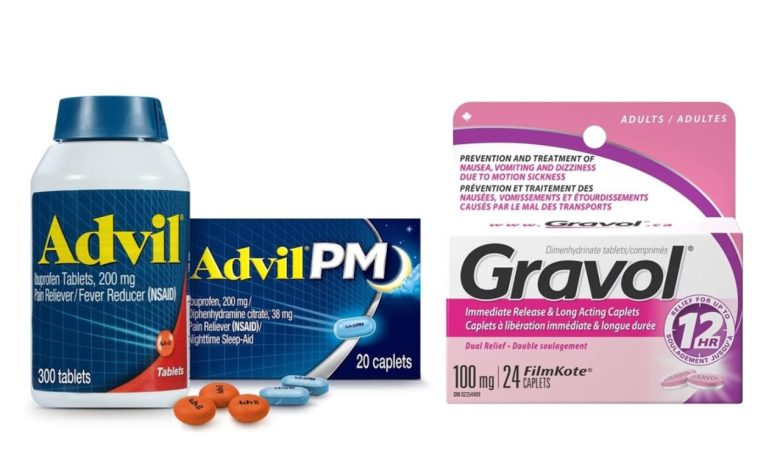Can You Take Advil And Gravol Together At Thesame Time?

Advil (Ibuprofen) and Gravol (Dimenhydrinate) are two commonly used over-the-counter medications with distinct purposes. Advil, also known as ibuprofen, is a nonsteroidal anti-inflammatory drug (NSAID) used to relieve pain, reduce inflammation, and reduce fever. Gravol, on the other hand, is an antihistamine medication that is used to treat nausea and vomiting caused by motion sickness, surgery, or other medical conditions. However, it is not uncommon for people to wonder if these two medications can be taken together. This blog post aims to explore whether or not it is safe to take Advil and Gravol together and the potential risks and benefits of doing so.
Can Advil and Gravol be taken together?
The simple answer is yes, Advil and Gravol can be taken together, but it is important to use caution and only under the guidance of a doctor or healthcare professional. The reason for this caution is that both Advil and Gravol can cause similar side effects, including drowsiness and dizziness, which can be exacerbated when taken together. Additionally, both medications can increase the risk of bleeding, especially when taken in high doses or for extended periods of time. Therefore, it is essential to consult a healthcare professional before taking these medications together to avoid any potential adverse effects.
What are the benefits of taking Advil and Gravol together?
Taking Advil and Gravol together may provide relief from several symptoms, including pain, inflammation, nausea, and vomiting. Advil can reduce pain and inflammation caused by conditions such as arthritis, menstrual cramps, and headaches, while Gravol can alleviate nausea and vomiting caused by motion sickness or medical conditions such as gastroenteritis. When taken together, they may provide a more comprehensive relief of symptoms, making it easier for people to manage their symptoms and improve their quality of life.
What are the risks of taking Advil and Gravol together?
Taking Advil and Gravol together can increase the risk of side effects, including drowsiness, dizziness, and impaired coordination. These side effects can be particularly dangerous when driving or operating heavy machinery, as they can impair the ability to perform these activities safely.
Additionally, both medications can increase the risk of bleeding, especially in people who have a history of bleeding disorders or are taking other medications that increase the risk of bleeding, such as blood thinners. Therefore, it is essential to consult a doctor or healthcare professional before taking these medications together to avoid any potential adverse effects.
What are the recommended doses of Advil and Gravol?
The recommended doses of Advil and Gravol depend on several factors, including the person’s age, weight, and medical history. Generally, the recommended dose of Advil is 200-400 mg every 4-6 hours as needed, with a maximum daily dose of 1200 mg for adults. The recommended dose of Gravol is 50-100 mg every 4-6 hours as needed, with a maximum daily dose of 400 mg for adults. However, it is important to note that these doses are general guidelines and may vary based on individual circumstances. Therefore, it is essential to consult a healthcare professional before taking these medications to determine the appropriate dose for your specific situation.
What are the potential interactions between Advil and Gravol?
Although they can be taken together, there are potential interactions that people should be aware of.
1. Increased risk of bleeding: Both Advil and Gravol can increase the risk of bleeding, especially when taken in high doses or for extended periods of time. Taking them together may increase this risk even further, particularly in individuals with bleeding disorders or those taking other medications that increase the risk of bleeding, such as blood thinners.
2. Central nervous system depression: Both Advil and Gravol can cause drowsiness and impair coordination. Taking them together may increase the severity of these side effects, leading to central nervous system depression. This can affect an individual’s ability to perform tasks that require alertness, such as driving or operating heavy machinery.
3. Gastrointestinal effects: Advil can irritate the lining of the stomach and increase the risk of gastrointestinal bleeding and ulcers. Gravol can also have gastrointestinal side effects, such as constipation or diarrhea. Taking them together may increase the risk of these side effects.
4. Other drug interactions: Advil and Gravol may interact with other medications, including prescription medications, over-the-counter medications, and herbal supplements. It is important to inform your healthcare provider of all medications and supplements you are taking before taking Advil and Gravol together to avoid any potential interactions.
5. Renal toxicity: Advil can cause kidney damage, particularly when taken in high doses or for extended periods of time. Gravol can also have adverse effects on the kidneys. Taking them together may increase the risk of renal toxicity.
6. Cardiovascular effects: NSAIDs, including Advil, can increase the risk of cardiovascular events such as heart attack and stroke. Although Gravol does not have direct cardiovascular effects, taking it with Advil may increase the risk of cardiovascular events.
Conclusion
Taking Advil and Gravol together can provide relief from several symptoms, including pain, inflammation, nausea, and vomiting. However, it is important to use caution and only under the guidance of a healthcare professional. Both medications can cause similar side effects, including drowsiness, dizziness, and impaired coordination, which can be exacerbated when taken together. Additionally, both medications can increase the risk of bleeding and have adverse effects on the kidneys and gastrointestinal tract. Therefore, it is essential to consult a healthcare professional before taking these medications together to avoid any potential adverse effects. It is also important to inform your doctor or healthcare provider of all medications and supplements you are taking before taking Advil and Gravol together to avoid any potential interactions.





